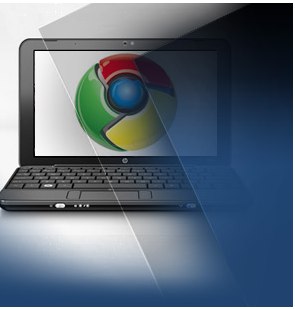Google on offense: Chrome OS is a wager on the future of computing

When it comes to Google's entry into the Microsoft-dominated computer operating system business, there's a bigger question as to whether Google's move is an offensive one or a defensive one?
Microsoft's official comment on Google's latest announcement seems to be a big fat "no comment" from Bill Gates himself at a conference of media execs in Sun Valley, Idaho this week. But, Walid Abu-Hadba, Microsoft’s Vice President of Developer and Platform Evangelism, told VentureBeat yesterday that Google's Chrome OS has nothing to do with making computing simpler and faster, nor is it part of a greater plan to go after Microsoft's dominance. Instead, Abu-Hadab said Google is "on the defensive," trying to keep competitors from going after the lucrative search business. From the Venture beat post:
He argued that whenever Google enters a new market, like releasing mobile operating system Android, it’s trying to force competitors to focus on existing products, rather than challenging Google in search. And the company may actually feel threatened for the first time in years, since Microsoft recently made a splash with its revamped “decision engine” Bing, and traffic appears to be growing.
I don't know if I'd go so far as to say that Google is entering new markets as a way of keeping competitors from going after search. I also don't agree that Google's entry into computer operating systems is a defensive move. On the contrary, this step is another example of Google's innovation and push toward an all-cloud way of computing.
Also see:ZDNet's full coverage of Google Chrome OS
Initially, this OS is going after a netbook market and working under the assumption that there is a growing group of people - young people, if you will - who are comfortable with a life in a cloud and are looking for a computer system that understands that about them. Consider this exchange between Google co-founder Larry Page and CEO Eric Schmidt at SunValley, as told by the Wall Street Journal:
Mr. Page described the Chrome operating system as a kind of anti-operating system — one that is basically indistinguishable from a browser. Netbooks loaded with Chrome will boot up almost instantaneously and will store data on the Internet instead of a hard drive.
“I wanted the operating system to kind of be out of the way,” Mr. Page said.
“If you live your life in the browser maybe you don’t want all the stuff that came from Eric’s generation,” Mr. Page added, putting his hand on Mr. Schmidt’s shoulder.
Mr. Schmidt leaned back in his chair and groaned at being characterized as an old guy. “Why am I always in this position?”
When you're an innovator, you have to think about the future. When you're thinking about the future, you have to observe young people. In this case, I think of my teen and pre-teen kids and their comfort level with the Internet.
When it comes to computing, pretty much everything they do is tied to the Internet, which means they jump back and forth between computers in the house with ease because everything that's important to them is online. Even their school reports are written in Google Docs and then converted to PDF to be printed. (Yes, their dad is kind of geeky so they have been exposed to online services like that from an early age.)
In Sun Valley, Google may be saying that Chrome OS is not a competitor to Microsoft because it's looking to expand the market for netbooks, not chip away at Windows’ share of the netbook market. In Silicon Valley, we know better. Google is innovating, changing the computer OS game and rewriting the rules so that the next generation can play along, too.
Also see: Google Chrome OS is a game changer
It's probably a good thing for Google to have Microsoft executives call the move a defensive one. Microsoft can go back to work on Windows 7 and its successors while Google watches the kids of today - who are growing up with a high comfort level around cloud computing - become the trend setters of tomorrow.
To use a football analogy (largely because I'm really anxious for the start of the NFL season), Microsoft is waiting for Google to throw a long pass into the end zone - but that's not what's happening here. Google is running a series of short running plays - 3, 4, 5 yards at a time - and is inching closer and closer to the end zone without Microsoft realizing that it's giving up valuable yards.
Also see: Chrome OS: good for you; bad for Microsoft
Google has put its competitors on the defensive. Those that realize it and start countering with smart plays of their own are the ones that will make it through the whole season. (Still working that football analogy.) Those that don't may be the ones standing in an empty stadium at the end of the game, wondering where all of the fans have gone.